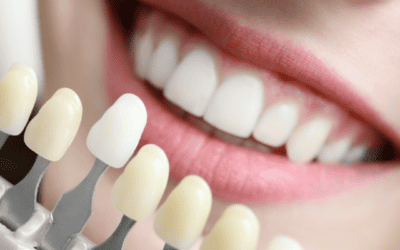Our last blog, Fighting Gum Disease Part 1 – Why Gum Health Matters, told us about the links between gum disease and the health of the rest of our body. Now that we understand how serious gum disease can be, what are the signs and symptoms and what can we do about it?
Recap – what is gum disease?
Gum disease is inflammation and infection caused by bacteria. The bacteria irritate our gums. This is because our body recognises them as a foreign object and starts trying to defend itself. Loads of cells rush to the area, which is what causes inflammation – your gums may swell and bleed when touched. In these early stages, we call it gingivitis.

Gingivitis – red and bleeding gums.
However, some people’s immune systems take it too far, and the body basically starts the process of trying to get rid of this foreign object and anything else in the way. Periodontitis is when gum disease progresses and the connections between the tooth and the gum start to get destroyed. This including the bone around the tooth. The tooth will start to get loose and over time, if treatment is not sought, the tooth will become so loose it can fall out.

Periodontis. The supporting bone is lost. Here
we see the teeth looking longer and gaps are
appearing between the teeth.
Signs and Symptoms of gum disease
- Bad breath
- Red, swollen or tender gums
- Bleeding gums
- Sensitive teeth or gums
- Painful chewing
- Gap developing between the teeth and the gum
- Teeth that appear to be drifting/moving; gaps between teeth that weren’t there before
- Teeth that become loose
- Bad taste in the mouth; pus coming out from the gums
- Teeth that appear longer or fit together differently when you bite
- Or no symptoms at all
Risk Factors for gum disease
Smoking
People who smoke less than 10 cigarettes per day are two times more likely to develop gum disease. For heavier smokers, this increases to four to five times more likely. In addition, the more cigarettes smoked, the worse the gum disease. Smokers do not respond as well to gum treatment as non-smokers. (1)
Poor oral hygiene
This means poor brushing technique and not cleaning between the teeth thoroughly. Did you know that 40% of the surfaces of your teeth are actually between the teeth. Your toothbrush can’t reach this area. This is why it’s important to use something to clean between your teeth.

Using brushes to clean between
your teeth is the key to healthy gums.
Diet
Sugars and acidic foods and drinks cause the plaque bacteria to thrive. The more bacteria, the more inflammation and infection.
Tooth abnormalities
Teeth with cracks and crevices trap food and lead to increased bacterial growth
Poor dental work
Fillings, crowns and other dental work done poorly can lead to gaps and surfaces where plaque bacteria will gather.
Wisdom teeth
Wisdom teeth that are coming through the gum and those that are impacted (stuck) can be a huge breeding ground for bacteria.
Tooth grinding
Studies have shown that those who grind their teeth can cause swelling of the little ligaments around the teeth which can lead to infection.

A hard splint (mouthguard) can help protect
the teeth from the effects of tooth grinding.
Genetics
Up to 30% of adults are genetically susceptible to gum disease. If a parent or grandparent has lost teeth early – make sure you are keeping on top of your oral health and having regular dental visits.
So what can be done?
Regular dental examinations allows the dentist to track the health of your gums. They will measure the gap around the tooth and the gum, assess bleeding and plaque and calculus (hardened plaque).
Regular dental cleanings will reduce plaque and calculus,which if left will lead to more plaque bacteria.

Book in to see our friendly and knowledgeable
team for your check-up and clean.
Your dentist will also assess your previous dental work for any areas where plaque bacteria may trap, assess wisdom teeth if required and give you advice on your oral hygiene and cleaning techniques.
If there are any changes in your gums or oral hygiene, which may be too subtle for you to notice, with regular dental examinations, your dentist will be on top of it.
What is the treatment?
Gum disease in it’s early stages in reversible and treatment is straightforward. However, if left too long, it can become difficult or even impossible to treat.
In it’s very early stages, all that may be required are some changes to your brushing habit. At your check-up appointment the dentist will give you advice on your brushing technique and the best method for you to clean between your teeth.

Regular tooth cleaning is the key to preventing
and treating gum disease.
If there are build-ups of plaque and calculus the dentist will clean these off and polish the teeth for you. Depending on how much cleaning is needed, this can be done with an ultrasonic tooth cleaner, a hand scaler or a combination of both. People with very sensitive teeth tend to prefer manual scaling, as they might find the water spray sensation of the ultrasonic cleaner uncomfortable.
If gum disease has been diagnosed, depending on the severity, the dentist may wish to see you more frequently for assessments and cleaning of the teeth and gums. This allows for modification of your at-home care, and more frequent professional cleans.

Referral to a specialist and/or medication may
be required to treat advanced gum disease.
If there is no improvement in your condition or the gums are deteriorating rapidly, a referral to a gum specialist may be required. A periodontist is a gum specialist. Treatment by them can involve further cleaning, surgery and/or the use of antibiotics.
What should I do if I’m worried about my gums?
If you are worried about your gums (they are sore, bleeding, look red or puffy) please arrange a dental appointment for a check-up.
Regular teeth cleaning and check-ups help maintain good oral health and prevent major problems from occurring. Our highly trained dentist and dental assistants do a thorough check of your teeth, gums and mouth, picking up on things before they become an issue.
Call us on 0732111155 , book online or read more here.
Sources and Further Reading
https://www.betterhealth.vic.gov.au/health/HealthyLiving/smoking-and-oral-health


